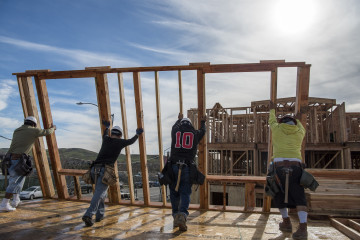Experience Shows the U.S. Can Weather the Storm: Tyler Cowen

published Aug 31, 2017 10:16:55 AM, by Tyler Cowen
(Bloomberg View) —
As the rain and wind from Hurricane Harvey clear out, and the physical and human toll becomes clear, it’s worth looking at what research tells us about storms and their costs. In particular, recovery and resilience are often stronger forces than we expect.
The storm, although described as an unprecedented weather event for the U.S., isn’t leading to general forecasts of a recession. The stock market reaction has been muted, even though Houston is the nation’s fourth largest city.
A Bloomberg survey of economists this week found that they expect U.S. gross domestic product growth to slow in the third quarter, thanks to the storm, and then pick up in the fourth quarter as rebuilding gets under way.
But the research shows natural disasters are not good for economic growth. The resources that go into rebuilding after a big storm could have been used elsewhere, and there is no good reason to think that an economy, either at the national or regional level, will come out ahead.
That said, the future after a big storm doesn’t have to be so grim. One body of research looks at how cities bounce back from natural and man-made catastrophes. If we consider the 1871 Chicago fire, the 1906 San Francisco earthquake, the 1889 Johnstown flood, or the 1900 Galveston hurricane, after rebuilding periods economic progress continued in each case. Even the bombings of Japanese cities during World War II didn’t affect their longer-term economic futures very much. New Orleans, which seems to have become a permanently smaller city after Hurricane Katrina in 2005, is the exception.
What about the fates of individuals affected by major storms? The best study we have, conducted by economist Steven Levitt and co-authors, found that within a few years, Katrina victims’ incomes fully recovered. Additional research found that people who relocated after Katrina (often to Houston, by the way) often improved their incomes. I wouldn’t expect those same income upgrades after Hurricane Harvey, because Houston is a wealthier and better-managed city than was New Orleans. Still, Americans have a remarkable ability to bounce back and rebuild their lives and job prospects.
Perhaps the most important lesson is just how much general prosperity matters. While Harvey raged, monsoon-related floods in India, Bangladesh and Nepal killed at least 1,200 people and left millions homeless. To the extent matters are less tragic in Texas and Louisiana, it is in large part because the U.S. is a wealthier society with stronger infrastructure, better built homes and more sophisticated response capabilities.
A big question after Hurricane Harvey, however, is whether our modern system of public and private flood insurance is adequate to the task, and whether rebuilding incentives need to change. By some estimates, about 80 percent of the victims do not have flood insurance. Damage to homes thus will devastate many families’ savings. Given the extreme and unprecedented nature of the storm, it is not clear what kind of preparation might have been reasonable to expect.
Greater federal aid to the victims is a likely option. Still, it will not be obvious to many Americans why those who lost homes might end up receiving higher government benefits than people elsewhere who never had homes in the first place, and who may have inferior income prospects, especially if they live in rural areas. Many Texas congressional representatives voted against federal aid when Hurricane Sandy hit New York and New Jersey in 2012. That sounds cruel, but we also have to guard against the tendency for aid decisions to be driven by media cycles rather than the nation’s most serious structural problems.
One commonly discussed “economist’s solution” is to limit federal bailouts, and get the federal government out of providing flood insurance, in the hope that homes will not be built on risky floodplains. It doesn’t make sense to have $663,000 in payouts sent to one Mississippi home, which has flooded out 34 times in 32 years.
That all makes sense in theory, but it also illustrates the limitations of economics. The homes are already built in precarious places, and in the Houston area the damage has already been incurred. Are we prepared to forgo giving federal aid, just to set a precedent for the future? If anything, acting tough could lead to a backlash against the politicians who do so, and make it all the more clear that future bailouts will be forthcoming. Maybe the best we can do is to price flood insurance more appropriately, in recognition that climate risks are higher now. Over the longer run, as housing stocks turn over, that will help limit homeowner and also fiscal exposure to extreme events.
So while our current response capabilities are better than we might think, improving that performance very much won’t be easy.
This column does not necessarily reflect the opinion of the editorial board or Bloomberg LP and its owners.
Tyler Cowen is a Bloomberg View columnist. He is a professor of economics at George Mason University and writes for the blog Marginal Revolution. His books include “The Complacent Class: The Self-Defeating Quest for the American Dream.”
To contact the author of this story: Tyler Cowen at tcowen2@bloomberg.net To contact the editor responsible for this story: Stacey Shick at sshick@bloomberg.net
copyright © 2017 Bloomberg L.P







No Comment